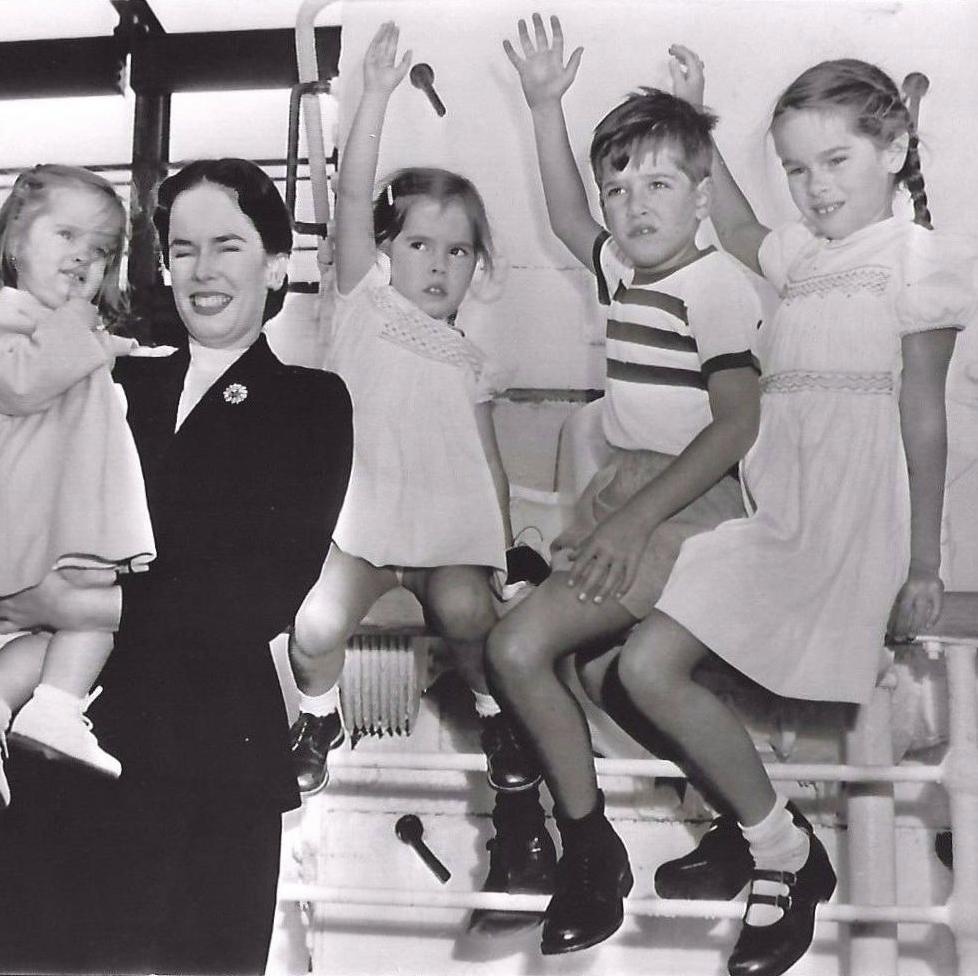
Biographies: Charlie Chaplin (England/America, 1889-1977)

Figure 1.--Charlie Chaplain turned from film making to politics in the 1930s. He was saw the barbarity of Fascism which we see in 'The Great Dictator', but his ideologial orientation blinded him to the barbarity od Sobiet Communism. Thus he defended the Soviet Union in the developing Cold War. This is the Chaplain family leaving America as a result of law suits and FBI prosecutions (September 8, 1952). The press caption here read, "Mrs. Charlie Chaplin, the former Ooona O'Neill, and her four children line the rail of the liner 'Queen Elizabeth' before the ship sailed from here [New York] yesterday. The actor-producer did not appear on deck with his family. He boarded the liner earlier and remained in seclussion to avoid posible process servers in connection with a $13,000 civil suit. Mrs. O'Neill holds Victoria, 19 months old. The other children are (left to right) Josephine, three, Michael, six, and Gerldine, eight. The Chaplins will spend six months in Europe on a combined business and pleasure trip." In fact, Chaplain would never return to America. He could have returned fter the McCarthy era, but described America as a 'sad' country and refused to do so. If the faces look familiar, Geraldine would have her own important acting career. Many will remember her as Tonya in 'Doctor Zhivago' (1965) -- a film banned in the Soviet Union. We are not sure what her father thought about that.
|
|
Charles Spencer Chaplin is an icon of the early-Hollowoiod silent film era. He was born in London (1889) and had a very difficult childhood. His father provided little support. His mother had mental problems and struggled to pay basic bills. He has two sessions in the work house as a young boy, attending pauper schools. He had to begin supporting himself. His mother was committed to a mental asylum when je was only 14 years old. Charlie supported himself performing with touring music halls and then joining an acting troupe. He then began performing as a stage actor and comedian. As he gained sucess he was signed by the important Fred Karno company which brought him to America. He was signed by the famed Keystone Studios (1914). He he stayed in England he amost certainly would have been drafted for World War I service. Very soon he became making a name for himself as 'The Tramp'. Chaplin was soon directing his own films. He moved through several studios (Essanay, Mutual, and First National). In only a few years his Tramp persona had made him one of the most famous and well loved individuals in the world and very wealthy (1918). To gain control over their films, Chaplin, Douglas Fairbanks, and Mary Pickford, Hollywood giants and close friends formed United Artists (1919). Pickford would have a falling out with him, but UA persisted as an important Hollywood distribution studio. One of this greatest films followed, 'The Kid' (1921), introducing one of Hollywood's great child starrs -- Jackie Coogan. With the advent of the takies, Chaplain's career wained (1930s). He became increasingly involved in politics. the was disturbed by the brutality of the NAZIs, although he expressed no pron,em with soviet brutality. He made only a few filns in the 30s, but achieved no sucesses. He did have one more triumph, 'The Great Dictator' satarizing Adolf Hitler and the NAZIs. It took some time to produce. He met resistance. But because of his personal wealth, he produced it helself. Hollywood did not want to antagonize the NAZIs because of the German box office. The British Government was pursuing appasment was not going to allow the film to be run, but by the time Chaplain released it, Hitler and Stalin had unleased World War II. The British found it useful propanganda. Meanwhile, Chaplin ran into trouble with the Federal Bureau of Investigation (FBI). Chaplin never applied for U.S. citizenship. And while he was critial of NAZI totalitarianism, he continued to ignore Soviet totalitarianism which commited the same horendous crimes for which he criticized the NAZIs. (Ironically his daughter's film Dr Zivago) based on Boris Pasternak's monumental book would be banned by the Soviets. While not a U.S. citizen, Chaplin began criticizing U.S. Government policy during and after the War. The FBI pursued largely trumped up moral charges against him. He was active in Communist-front organizations. He criticized investigtions of suspected Communists, especialy individuals in the entertaiment industry as well as U.S. procecution of Soviet espionage agents.
HBC

Navigate the Boys' Historical Clothing Web Site:
[Return to the Main biography C page]
[Return to the Main biography page]
[About Us]
[Introduction]
[Activities]
[Biographies]
[Chronology]
[Clothing styles]
[Countries]
[Bibliographies]
[Contributions]
[Essays]
[FAQs]
[Glossaries]
[Images]
[Links]
[Registration]
[Tools]
[Boys' Clothing Home]
Created: 6:42 AM 1/1/2017
Last updated: 6:42 AM 1/1/2017



